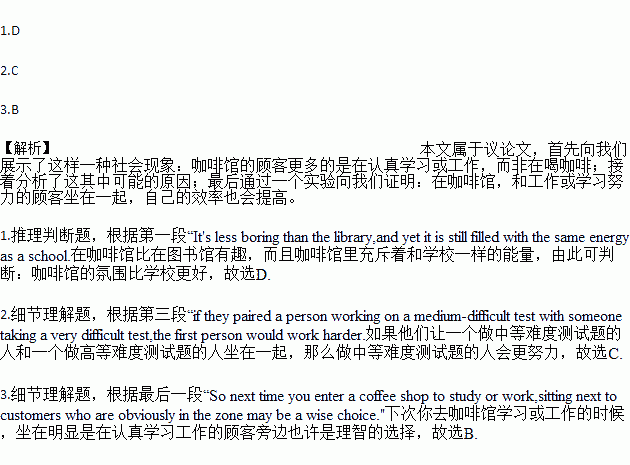题目内容
It's a scene so common: Coffee shops are filled with customers who seem more absorbed in their study or work than in their drinks.The coffee shop has become a popular place for modern-day students and workers.It's less boring than the library,and yet it is still filled with the same energy as a school.
There might be a good reason why students are drawn to social spaces like coffee shops for study.A recent study conducted by researchers in Belgium indicates that productivity may increase in coffee shops.
As part of the study,about 40 participants were placed side-by-side in pairs and asked to undergo(经历)reaction-time tests.Each participant sat in front of a computer screen,which flashed different colored squares.The goal for each person was to hit the key on the keyboard that corresponded with each square.Though each participant worked separately,they were affected by how hard their neighbor was working.The researchers varied the difficulty levels of each person's test,and they found that if they paired a person working on a medium-difficult test with someone taking a very difficult test,the first person would work harder.Not only that,but the first person's accuracy would also improve.
"It seems like noticing that their partner is working hard motivated people to work hard too,"a researcher explained.But the researchers couldn't exactly explain why."One possibility is that the hard workers' body position got noticeably more tense.So next time you enter a coffee shop to study or work,sitting next to customers who are obviously in the zone may be a wise choice."
1.Why do students prefer to study in coffee shops rather than in libraries?
A. They can enjoy drinks while studying.
B. It's too boring for them to study in a library.
C. They can conduct their academic researches.
D. Coffee shops have a better atmosphere.
2.How would a participant be affected by a neighbor doing a more difficult test?
A. He would work less hard.
B. He would possibly give up.
C. He would achieve better results.
D. He would change the difficulty level.
3.What can we learn from the last paragraph?
A. Further research will be done in the future.
B. Sit next to a hard worker if you want to study.
C. Customers should sit tensely in a coffee shop.
D. The researchers have fully explained the result.



 Nowadays, therefore, with the development of modern society, people are living a
Nowadays, therefore, with the development of modern society, people are living a